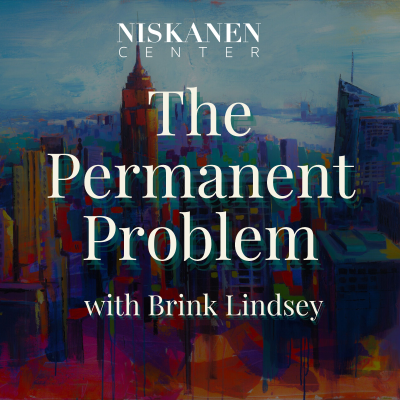
The Permanent Problem
Englisch
Kostenlos bei Podimo
Kostenlos hören bei Podimo
Starte jetzt und verbinde dich mit deinen Lieblingspodcaster*innen
- Vertraut von über 1 Mio. deutschen Hörer*innen
- Über 1.000 lokale Podcasts und Shows – nur bei Podimo
- Keine Zahlung nötig
Mehr The Permanent Problem
In dozens of provocative essays published on his Substack and cross-posted here, Brink Lindsey has explored what John Maynard Keynes called humanity’s “permanent problem:” the quest to “live wisely and agreeably and well” with the vast resources and powers that capitalist prosperity has bestowed upon us. That quest, unfortunately, has gone awry in the 21st century. In Lindsey’s analysis, capitalism is now experiencing a “triple crisis”: a crisis of dynamism, as economic and technological progress had slowed; a crisis of inclusion, as a deep new class divide has opened up along educational lines; and a crisis of politics, our best hope for addressing the other two crises, as the values, norms, and institutions of liberal democracy are now embattled around the world. Beginning in January 2024, Lindsey started the Permanent Problem podcast to supplement his ongoing essay series. The podcast focuses on capitalism’s triple crisis – and especially on the prospects for defusing the crisis and revitalizing social progress. Brink Lindsey, the podcast host, is a senior vice president at the Niskanen Center. You can access his essays on “The Permanent Problem” on his Substack and here. You can find all episodes of the podcast on his Substack, here, Spotify, Stitcher, or wherever you listen to your podcasts.
Alle Folgen
10 FolgenAbundance and the Democrats, with Jonathan Chait
On this episode of The Permanent Problem podcast, host Brink Lindsey welcomes Jonathan Chait of The Atlantic to discuss the abundance movement and the future of the Democratic Party. Chait sees a major role for abundance-based ideas in challenging the agenda-setting power of "the groups," or progressive activists, and pulling the party back toward the cultural mainstream; Niskanen, meanwhile, has been a leader in developing the synthesis of libertarian ideas (housing deregulation, permitting reform) and liberal ones (expanding state capacity, prioritizing the clean energy transition) that underlies the abundance agenda. Lindsey and Chait review the intellectual journeys that led to this convergence of perspectives -- from Lindsey's early attempts at a "liberaltarian" synthesis and Chait's sharp rejection of it, to their discovery of common ground against the backdrop of rising illiberalism on both the right and left.
Christianity and democracy, with Jonathan Rauch
While the formal separation of church and state is a vital element of America's constitutional order, the success of our long-running experiment in self-government has always depended on a healthy interdependence between republican freedom and religious faith. So argues Jonathan Rauch in his new book Cross Purposes: Christianity's Broken Bargain with Democracy. "In American civic life, Christianity is a load-bearing wall," writes. "When it buckles, all the institutions around it come under stress, and some of them buckle, too." On this episode of The Permanent Problem podcast, Rauch joins host Brink Lindsey to discuss secularization and the rapid decline of organized Christianity in recent decades -- in Rauch's words, the combination of "thin Christianity" in the mainline denominations and increasingly "sharp Christianity" among self-described evangelicals. They examine the underlying causes of these developments, how they stoke polarization and undermine democratic values and institutions, and what a healthier "thick Christianity" might look like.
Symbolic Capitalists and "Awokenings", with Musa al-Gharbi
The rightward shift in public opinion that carried Donald Trump back into the White House is being widely interpreted as a backlash against the "Great Awokening" of the past decade -- a surge in radical progressive activism around social justice issues that featured a number of extreme and unpopular positions ("defund the police," "abolish ICE," support for Hamas after the October 7 attacks, etc.). In his new book We Have Never Been Woke, Stony Brook University sociologist and Niskanen Center senior fellow Musa al-Gharbi argues that this is only the latest in a series of "awokenings" over the past century. In each case, he contends, the focus was more on competition within the growing ranks of "social capitalists" (i.e., knowledge workers) than on the plight of the poor and marginalized -- and the net impact consisted more in stoking backlash than in actually driving progress. On this episode of The Permanent Problem podcast, host Brink Lindsey sits down with al-Gharbi to discuss his new book, reviewing the rise of "symbolic capitalists" to economic and cultural dominance and analyzing the dynamics that have led to the poisonous politics of the present day.
Abundance and collapse, with Eli Dourado
A new movement is taking shape around the idea of restoring "abundance." Uniting thinkers from across the political spectrum -- including "supply-side progressives," "conservative futurists," and "state capacity libertarians" -- the movement aims to jump-start technological and economic progress by removing artificial constraints on supply and improving the quality of government. On this episode of The Permanent Problem podcast, Brink Lindsey interviews a leading analyst and advocate of abundance: Eli Dourado, chief economist at the new Abundance Institute and an expert on policy barriers to the emergence of new technologies. Discussing the "great stagnation" in productivity growth, Lindsey and Dourado focus on how most of productivity growth occurs outside the R&D lab, and how therefore broad institutional and cultural factors weigh heavily in determining an economy's overall vitality. Sharing an interest in the work of anthropologist Joseph Tainter, a leading theorist of civilizational collapse, the two also discuss our modern technological civilization's vulnerability to decline and cataclysm -- and how an abundance agenda can reduce that vulnerability.
Decoding the birth rate decline, with Tim Carney
Birth rates are plummeting around the globe, as half the world's population now lives in countries with sub-replacement fertility rates. Total population is already falling in Japan, Italy, and China, and global population decline looks likely to begin within a few decades. Yet as American Enterprise Institute senior fellow Tim Carney points out in his new book Family Unfriendly, the United States bucked these worldwide trends until relatively recently. As of 2007, the U.S. was above replacement fertility and even trending upwards, but since then births have fallen off sharply. On this episode of the Permanent Problem podcast, Tim Carney joins host Brink Lindsey to discuss why low fertility and population decline are problems worth worrying about, examine the social and cultural trends that are pushing us away from parenthood and family, and take a look at the exceptional places that continue to embrace big families for clues as to how things might turn around.















































